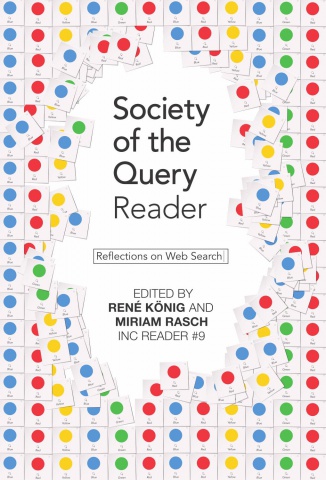René König, Miriam Rasch (eds.): Society of the Query Reader: Reflections on Web Search (2014)
Filed under book | Tags: · algorithm, google, internet, memory, search, software, technology, web

Looking up something online is one of the most common applications of the web. Whether with a laptop or smartphone, we search the web from wherever we are, at any given moment. ‘Googling’ has become so entwined in our daily routines that we rarely question it. However, search engines such as Google or Bing determine what part of the web we get to see, shaping our knowledge and perceptions of the world. But there is a world beyond Google – geographically, culturally, and technologically.
The Society of the Query network was founded in 2009 to delve into the larger societal and cultural consequences that are triggered by search technology. In this Reader, which is published after two conferences held in Amsterdam in 2009 and 2013, twenty authors – new media scholars, historians, computer scientists, and artists – try to answer a number of pressing questions about online search. What are the foundations of web search? What ideologies and assumptions are inscribed in search engine algorithms? What solution can be formulated to deal with Google’s monopoly in the future? Are alternatives to Google even thinkable? What influence does online search have on education practices? How do artists use the abundance of data that search engines provide in their creative work? By bringing researchers together from a variety of relevant disciplines, we aim at opening up new perspectives on the Society of the Query.
Contributors: Aharon Amir, Vito Campanelli, Dave Crusoe, Angela Daly, Vicențiu Dîngă, Martin Feuz, Ulrich Gehmann, Olivier Glassey, Richard Graham, Mél Hogan, Ippolita, Kylie Jarrett, Min Jiang, Anna Jobin, Phil Jones, Simon Knight, Dirk Lewandowski, M.E. Luka, Astrid Mager, Martina Mahnke, Andrea Miconi, Jacob Ørmen, Martin Reiche, Amanda Scardamaglia, Anton Tanter, and Emma Uprichard.
Publisher Institute of Network Cultures, Amsterdam, 2014
INC Reader, 9
Creative Commons Attribution NonCommercial ShareAlike 3.0 Unported License
ISBN 9789081857581
292 pages
Website of the network
Publisher
Georges Perec: The Machine (1972/2009)
Filed under play | Tags: · algorithm, computing, machine, oulipo
One of Georges Perec’s Oulipian works, the radio play The Machine was written “in collaboration with his German translator and close friend, Eugen Helmle, in the heady atmosphere of the Saarbrücken literary circle that met at Helmle’s house. The Machine is an early example of writing inspired by the existence of modern computers (Perec’s other computer-simulation, a stage play entitled [L’Augmentation, appeared in English as The Art of Asking Your Boss for a Raise in 2011]). It pretends to analyze and recompose, demolish and then rebuild a short lyric by Goethe that is almost indescribably well-known to all speakers and learners of German. To do this, it uses pretty much all the rewriting devices invented to date by Oulipo, and at the outset of Perec’s apprenticeship to a group that included many scientists and mathematicians far more learned than he, it served as a kind of demonstration piece, or Meisterstuck. Its inventiveness, irreverence, and closing sadness has made it just about the best-loved and most frequently rebroadcast example of the Neues Hörspiel, the name given to the experimental reinvention of radio drama that was such a marked feature of German literary culture in the 1960s and 1970s. Perec is nothing it not international.” (from David Bellos’s Introduction to the Review‘s special issue)
First broadcast on 13 November 1968 by Saarländischer Rundfunk, Saarbrücken
First published in German as Die Maschine, Reclam, Stuttgart, 1972
English translation by Ulrich Schönherr
Published in Review of Contemporary Fiction 26(1), Special Issue on Georges Perec, 2009
61 pages (pp 33-93)
via lermontov
Review (M.A. Orthofer, The Complete Review, 2009)
Commentary (Florian Cramer, Words Made Flesh, 2005)
Commentary (Hans Hartje, 1997, in French)
Commentary on a live performance of the English translation (Third Angel, 2012)
Matthew Fuller, Andrew Goffey: Evil Media (2012)
Filed under book | Tags: · algorithm, art, artificial intelligence, business, code, computing, data, database, event, governance, information, interaction, interface, knowledge, labour, language, machine, management, market, media, media theory, memory, military, networks, philosophy, political theory, politics, power, programming, software

“Evil Media develops a philosophy of media power that extends the concept of media beyond its tried and trusted use in the games of meaning, symbolism, and truth. It addresses the gray zones in which media exist as corporate work systems, algorithms and data structures, twenty-first century self-improvement manuals, and pharmaceutical techniques. Evil Media invites the reader to explore and understand the abstract infrastructure of the present day. From search engines to flirting strategies, from the value of institutional stupidity to the malicious minutiae of databases, this book shows how the devil is in the details.
The title takes the imperative “Don’t be evil” and asks, what would be done any differently in contemporary computational and networked media were that maxim reversed.
Media here are about much more and much less than symbols, stories, information, or communication: media do things. They incite and provoke, twist and bend, leak and manage. In a series of provocative stratagems designed to be used, Evil Media sets its reader an ethical challenge: either remain a transparent intermediary in the networks and chains of communicative power or become oneself an active, transformative medium.”
Publisher MIT Press, 2012
ISBN 0262304406, 9780262304405
235 pages
Review: Nicholas Holm (Media Int’l AU, 2013), Neural (2013).
Evil media on Monoskop wiki
PDF (updated on 2024-4-13)
HTML (added on 2015-8-28)
See also YoHa, et al., Evil Media Distribution Centre, 2013.
Comments (2)

